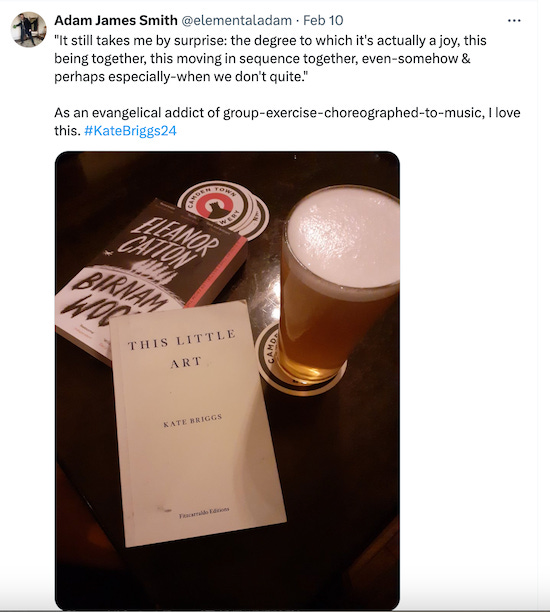#KateBriggs24 Week 6
This Little Art, p. 124-150 and Sessions of Feb. 24th, March 3rd and 10th
Thank you to those who were able to make the video call on Thursday evening! Kim and I had fun meeting those who were able to make it and hearing your thoughts on the books and the project. For those who couldn’t make it, we will do it again and will send out a survey to find the best possible day. We will also vary the times of our meetings so people from different time zones can make them. And if video calls are not your thing, we understand, and that’s totally fine.
How is your reading going? Let us know!
Many thanks to Slnieckar on Bluesky for finding this information on Roland Barthes’s very brief acting career!
As a follow-up, the Barthes Studies Bluesky account shared that Barthes wrote a short piece about the film, available in Signs and Images:
Schedule
Here’s what we are reading for the upcoming week:
Resources and Links
Kim’s #KateBriggs24 website has tons of links and resources, including books references in our readings and our full schedule. If you have suggestions of resources to add, let us know!
Rebecca Cullen wrote about Week 4 of #KateBriggs24. This comment cracked me up: “On the other hand, I highly doubt that even the Japanese have been strolling through gardens of cherry blossom, whipping out the writing implements of the time and knocking up 17 syllables of elegiac wonder on the instant. But Barthes is building this subjective literary conceit so seeming-earnestly, I shall take it as offered.”
On p. 135, Briggs mentions Nicholas Wroe’s article “Javier Marías: A Life in Writing.”
On p. 137, Briggs references Jen Hofer’s essay at Poetry Foundation called “Proximate Shadowing: Translation as Radical Transparency and Excess.”
On p. 144, Briggs mentions Lydia Davis’s essay “Eleven Pleasures of Translating.”
Discussion
Slnieckar on Kate Briggs describing what we are doing with this project:
From Adam James Smith:
Chiara Veltri, bringing us some color:
Catherine Eaton, sharing some haiku:
Sara Gore, returning to an earlier self:
Deidre Lynch, bringing us more Barthes:
And a closing thought from Catherine Eaton:
Thank you all for your company and your comments!
Find Kim on Twitter, Bluesky, and Instagram*
Find Rebecca on Twitter, Bluesky, and Instagram*
*Our Instagram accounts are locked, but we welcome bookish friend requests.














TLA, p. 136-139: I'm intrigued by the problem of saying things too fast -- I think I remember that it was Kasey who commented here about how Briggs wanted to recreate the path of her thinking and make it slow enough so the reader can spend time with the ideas and really feel them. To live with them for a length of time. And I suppose it's true that the ideas Briggs is working with can be boiled down to a few sentences, as she shows us on p. 138. But she does also make them feel very complex and rich by taking her time exploring them! And I can see how that idea led her to what goes on in The Long Form with the story of a day stretched out over 500 or so pages, so we really live that day fully and get a taste of what it's like to spend a day with a baby. Brilliant!
So many wonderful lines and ideas in the Session of Feb. 24! "The haiku can't be enlarged, its size is precise...it makes no leap into the symbolic, it's not a trampoline -- and the stars are too far away!"
"Dare I extend this hypothesis around Absolutely to the whole of literature? For, in its perfect moments, literature...tends to make us say: 'That's it, that's absolutely it!'" I love this idea and feel that it's true -- yes, we can interpret literature, but you can't say what's in it in any other way other than the thing itself.
"The 'truth' is in difference, not in reduction. There can be no *general truth*: this is what haiku says, one haiku after another."
"The *founding premise* of haiku; its nature (its aim) is to *silence*, at last, all metalanguage; therein lies haiku's *authority*: perfect harmony between *this* speech and my (rather than anyone else's) "incomparable" self."
I think I need more haiku in my life...